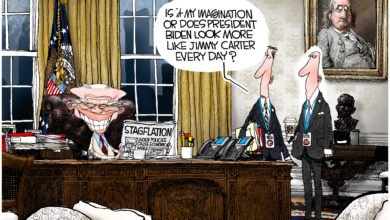Biden’s tax increases will reduce capital formation and lead to stagflation
President Biden has proposed that the capital gains tax rate be raised from the current maximum of 23.8% to over 40%. He also wants to raise the income tax rate on the top income earners to more than 40% and raise the corporate tax rate to 28%. While he says this is needed to raise more tax revenue to pay for his social programs and reduce income inequality, exactly the opposite will occur.
As an example, faced with slow economic growth because of a tax increase during his first term in office, President Bill Clinton wanted to stimulate the economy. He convinced Congress to reduce the maximum capital gains tax rate from 28% to 20%. Then also declared in his 1996 State of the Union speech that, “The era of big government is over.”
The capital gains tax cut created more capital that is vitally needed for a capital-intensive economy to grow. The new capital meant that even though the tax rate decreased, the lower rate created so much new capital that total tax revenue from capital gains increased significantly.
Between 1997 and 2000 total revenue from capital gains taxes nearly doubled from $66 billion to more than $127 billion. The annual GDP growth rate during those years was 4 ½%, which reduced unemployment and added more to government tax revenue.
Working with Speaker of the House Newt Gingrich, the federal government not only balanced the federal budget but had a surplus in each of the four years.
Raising the capital gains tax rate to more than 40% would drastically reduce capital formation. That would result in less tax revenue, a shortage of capital for business to expand and more income inequality, not less. That’s because a slow-growth economy means less opportunity for the lowest income earners.
Similarly, raising the tax rate on the highest income earners will also reduce capital formation. The reason is simple. As the tax rate increases, more tax dollars are given to the government. Since the highest income earners will continue to spend to support their lifestyle, the increase in taxes will lead to a decrease in savings and investment.
High-income earners provide most of the new capital created, so the less they save and invest, the less new capital is created.
Capital creation also comes from corporations. They earn income and pay taxes on that income. The balance after tax is either given to stockholders in the form of dividends or retained by the corporation to finance future growth. If the corporate tax rate is increased, the reduction in after-tax income will mean that after paying dividends, there are less retained earnings to finance future growth.
In other words, there is a reduction in new capital formation.
Already the federal government has pulled about $24 trillion from capital markets when government bonds were sold to pay the huge government deficits that have accumulated since 1963. Since then there have been 55 years of deficits in that 59 year period. And the deficits are getting worse, topping $3 trillion for both 2020 and 2021.
Not only will raising tax rates reduce capital formation and slow economic growth, but that action will lead to more inflation. Why? Because the federal government has moved to massively increase demand in the economy by rapidly expanding the money supply and by spending $3 trillion more each year than is taken in from tax revenue.
In order to meet the demand, the hope is that business will expand output and the economy will grow. To expand output, business will need more labor and more capital. With the still high unemployment rate, labor should be available. But if there is a capital shortage so business can’t raise capital to meet the increased demand, the only thing left to do is raise prices.
That means growth will slow and prices will rise. That condition is called stagflation, a problem we haven’t seen in more than 40 years.
To really reduce income inequality the economy must increase growth. That provides opportunity for well-prepared Americans to earn enough income to pay for their own food, shelter and healthcare.
The Biden approach of taking income away from those that earned it and give it to those who, for whatever reason, have not earned it, has led to a huge federal government budget deficit, a potential capital shortage, and eventually slower growth with higher prices.
Biden’s policies are simply wrong.



